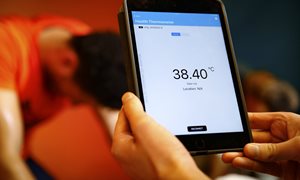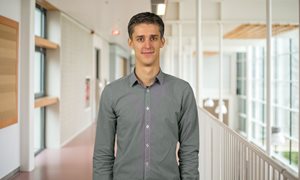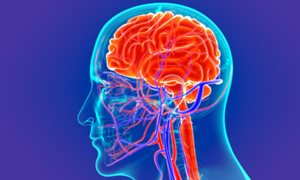
In the future, the Automatic External Defibrillator (AED) and the defibrillator will be able to do more than they do today. Now the devices can only give patients who need to be resuscitated a shock, but in time it will be possible, with the help of artificial intelligence, to say more about the condition of the resuscitated patient. Jos Thannhauser is affiliated with the Radboudumc and will receive his PhD from Radboud University on Thursday, September 30, for his research on the use of AI in the AED and defibrillator.
The chance of people surviving a sudden cardiac arrest outside the hospital has doubled in recent years. This is partly because in more and more places in the Netherlands an Automatic External Defibrillator (AED) is available, a portable device that can restore the heart rhythm by delivering a shock during a cardiac arrest. Ambulance personnel uses a defibrillator in case of resuscitation that also reads the heart rhythm. Nevertheless, the chance of survival after a cardiac arrest outside the hospital is low: 10 percent worldwide and about 23 percent in the Netherlands.
Technical physician and PhD student Jos Thannhauser thinks it can be done better. "A defibrillator can only give a shock. An AED is a bit smarter, because it also indicates whether a shock is advised or not. That's where the possibilities end now. We think more is possible with the patient's electrical heart signals that a defibrillator registers."
AI calculates the optimal moment
In recent years, he has been exploring that possibility in ventricular fibrillation, a disorder of heart rhythm that stops blood from being pumped around. A defibrillator stores patients' data in what is known as a cardiac ultrasound. Cardiopulmonary resuscitation (CPR) involves alternating chest compressions and ventilations. Thannhauser: "During these breaths, a 'smart' defibrillator can calculate the ideal moment for a shock: immediately or, on the contrary, continue chest compressions for longer?"
Research into the effectiveness of such an algorithm on the outcome of a resuscitation is ongoing in Italy. "My dissertation shows which requirements such an algorithm must meet so that it can actually be applied in practice. For example, the electrodes of the defibrillator must always be stuck to the patient in the same way," explains Thannhauser. The ultimate goal is to build these algorithms into AEDs and defibrillators.
Infarction or not?
The second part of Thannhauser's PhD research focuses on the cause of acute heart problems. Is the problem in the heart itself, or is it a clogged blood vessel? In the latter case, it's a heart attack and needs to be dilated as soon as possible. "But that can't be seen on the outside. Therefore, the advice is always to start resuscitation, regardless of the cause of the cardiac arrest."
During ventricular fibrillation, the heart gives a different electrical signal than in other heart problems, according to Thannhauser's research. In response, he developed a computer model that recognizes infarcts in 75 percent of the cardiac arrests studied. Thannhauser: "This is promising, but we now need to do more larger studies. We hope to eventually build this computer model into AEDs and defibrillators. That way, patients will receive exactly the care they need."
About the doctoral research
Dissertation title: Technical innovations in out-of-hospital cardiac arrest: On the road to a smart defibrillator. Promoters: Prof. Dr. N. van Royen and Prof. Dr. MJ de Boer. Co-promoters: Dr. MA Brouwer and Dr. JL Bonnes. This research was carried out by Jos Thannhauser at the Department of Cardiology of the Radboudumc, in collaboration with the University of Twente. The PhD ceremony will take place on 30 September at 14.30 in the Aula of the Radboud University and can be followed live here.
-
Want to know more about these subjects? Click on the buttons below for more news.
Related news items

Your heart rate as a thermometer Research Olympic athletes will be followed up during 4Daagse
18 July 2022Body temperature can be determined from heart rate. This is what research by the Radboudumc among Olympic athletes shows. Athletes can use this method during training to eventually perform better in the heat. The technique is now being further investigated among participants in the 4Daagse.
go to page
Want to be sustainable and cool? Choose fans more and aircon less Keep cool and help the environment
12 April 2022 A recent published study led by the University of Sydney, has found using indoor fans more often allows people to reduce their air conditioner use without changing how hot they feel, paving a way for reducing future energy use and greenhouse gas emissions. Coen Bongers, is one of the co-authors. go to page.aspx?width=800&height=534&ext=.jpg&type=BlockColumn1Zoom1)
Aiosyn and Radboudumc are the first in the Netherlands to implement AI in the clinical pathology workflow Digital pathology slides will be screened with a quality control algorithm
4 April 2022 Aiosyn, a company that develops AI-powered computational pathology analysis for clinical diagnostics, and the department of pathology of Radboudumc, will collaborate to implement an algorithm for quality control of digitized histopathology tissue slides. go to page
Thomas van den Heuvel wins Stairway to Impact Award for safer pregnancies using AI Award for safer pregnancies using AI
1 December 2021Radboudumc researcher Thomas van den Heuvel receives the Stairway to Impact Award from Dutch Research Council NWO. He receives this prize for the development of the BabyChecker, a smartphone application that allows midwives to make ultrasounds during pregnancies.
go to page

